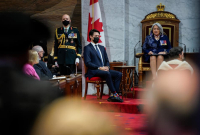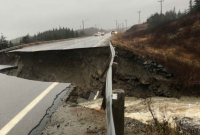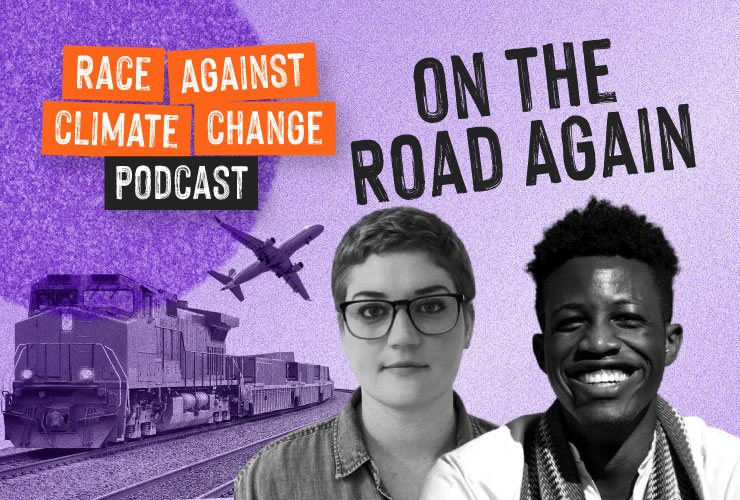Support strong Canadian climate journalism for 2025
A series of scathing reports from Canada’s climate watchdog have laid bare decades of failure to reduce emissions, with the current government tarred with “policy incoherence” across several files.
Used by the Commissioner of the Environment and Sustainable Development Jerry DeMarco to describe Prime Minister Justin Trudeau’s major initiatives, like the Trans Mountain expansion pipeline and Onshore Emissions Reduction Fund, “policy incoherence” is, in this case, a euphemism for policies that undermine long-term climate goals.
The Trans Mountain expansion would nearly triple capacity for the pipeline stretching from Edmonton to Burnaby, helping to facilitate increased production in the oilsands. Meanwhile, the emissions reduction fund was so poorly designed that it amounts to little more than a fossil fuel subsidy that may have actually increased emissions, the commissioner found.
DeMarco compared Ottawa’s climate policy to pushing a boulder up a hill, and said policies like those supporting the fossil fuel sector run counter to the goal.
“When departments are then pushing up the hill … there's other departments pushing on the other side of the rock pushing it back down, that's essentially what's happening,” he said.
The federal government under Trudeau’s watch famously declared a climate emergency and then approved the Trans Mountain pipeline the next day from Kinder Morgan for $4.5 billion to ensure the expansion’s construction. Though the official price tag for the project has swollen from $5.4 billion to $12.6 billion, some have calculated that with continued delays and increased insurance costs, it is likely approaching $20 billion.
A growing chorus of international energy forecasts says there is no room for any new fossil fuel development in a world that holds global warming to the Paris Agreement target of 1.5 C, and that oil demand will decline in every scenario. But as recently as this month, Trudeau said it’s important for Canada to make money off its oil and gas sector as part of his justification for following through on the pipeline’s construction. Ottawa has repeatedly said the pipeline’s revenue will be deployed to environmentally friendly projects.
However, a cost-benefit analysis from Simon Fraser University earlier this year found there “is no likely scenario in which (the Trans Mountain expansion project) will generate a net benefit to Canada.” Rather, the net cost is expected to range from $8.3 billion to $18.5 billion, with the “base case assumptions” projecting a loss of $11.9 billion to Canadians.
The “federal government is relying on years-old talking points about Trans Mountain that just don't match the science or economics,” said climate advocacy group 350 Canada’s Cam Fenton.
“It's becoming increasingly clear that the government doesn't have an answer for this incoherence and that threatens to undermine their entire climate agenda."
Government messaging around the onshore emissions reduction fund has similarly not held up to scrutiny. The fund was started with the purpose of helping oil and gas companies reduce emissions while remaining economically competitive. DeMarco’s findings, however, show the majority of companies that tapped the fund said it would increase fossil fuel production, and that some of the emissions targeted by the funding were already covered by other programs, leading to the risk of double counting. In other words, it was a cash handout to the oil and gas industry.
DeMarco said his primary interest was its impact on emissions, but the government said there were other objectives around investments and job retention and suggested he take a more “holistic” approach. DeMarco says he asked for data and the government couldn’t provide it.
“We asked for the data on how much value for money are you getting, what is the dollar cost per job saved, for example, and they can't show us that … because they aren't tracking that,” he said.
“They have to be able to say to taxpayers: We've gathered the $600 (million) to $700 million from the tax base of Canada, we're redistributing it to the fossil fuel industry, (and) here's the value you're going to get out of that. There just can't be assertions that there will be emissions reductions, or job retention, or investment, there needs to be data to back that up,” he said.
Not being able to track stated goals “goes contrary to the basics of performance management in government,” DeMarco said.
DeMarco makes several recommendations in his report covering the past 30 years of Canada missing climate targets. Among them are calls to centralize responsibility for climate change with the federal government, diversifying energy production to lower the risk of stranded assets, protecting workers and communities from any harmful impacts of a transition to a clean economy, developing a national energy strategy, and improving transparency.
Environmental Defence senior program manager Julia Levin called the report “a scathing indictment of a failure of leadership put in gentler words.”
“A huge part of why they're not wearing this as much as they should be — why they can get away with continuing these big policy decisions that make fighting climate change even harder … is because they know they're not being closely watched,” she said.
Still, Levin said the Liberal Party is starting to pay the price for dragging its heels as the climate crisis continues to barrel down on Canadians.
“Twice in a row they weren't given a majority government,” she said.
Speaking with reporters, Climate Minister Steven Guilbeault acknowledged Canada has been poor at policy implementation but said since 2015, the federal government has been making progress.
“We have to do more, and in the last election, Canadians told us very clearly: We want you to do more and to do it faster when it comes to climate change. And that’s certainly a message that I’ve taken at heart and so has the rest of our government and the prime minister,” he said.
Opposition climate critics were quick to weigh in.
In a statement, NDP environment critic Laurel Collins challenged the idea that since Trudeau took office, progress has been made, highlighting that, unlike its G7 peers, Canada’s total emissions are still growing, its per-capita emissions are the highest in the world, and the country ranks in the top 10 for countries that have contributed the most to climate change since the Industrial Revolution.
“While Mr. Trudeau pretends to be a climate leader, he continues to give big oil and gas billions in fossil fuel subsidies,” she said.
The Conservative Party’s shadow ministers for climate, natural resources, and official languages, MPs Dan Albas, Michelle Rempel Garner, and Alain Rayes, respectively, also issued a joint statement, taking a swing at the federal government.
“The finding that the Natural Resources Canada’s Emissions Reduction Fund was so poorly designed that the funding may have actually led to an increase in carbon emissions is ridiculous. We urgently need policies that incent the continued development of low-carbon energy and carbon reduction,” the statement read.
Green Party parliamentary leader Elizabeth May told Canada’s National Observer that confronting the climate crisis requires leadership from the top to encourage a genuine whole-of-government approach.
“Clearly, there's something wrong when you look at 30 years of failure,” she said, adding, “the failure to have the response to climate be seen as a whole-of-government responsibility is, I think, key.”
May described how U.S. President Joe Biden tapped former secretary of state John Kerry, who signed the Paris Agreement on the U.S.’s behalf, to be a special climate envoy and sit on the National Security Council.
“It's a very different approach than Justin Trudeau saying, ‘Here's your new environment minister and he's going to fix it all,’” May said.
“The environment minister should not be in charge of the climate crisis file. No one minister should unless it's the prime minister. This requires leadership.”
John Woodside / Local Journalism Initiative / Canada's National Observer
Story has been updated to reflect the Trans Mountain expansion was approved after the federal government declared a climate emergency.






Comments
“The environment minister should not be in charge of the climate crisis file. No one minister should unless it's the prime minister" Unless the prime minister is someone who famously said in 2017 "No country would find 173 billion barrels of oil in the ground and leave them there"
https://www.businessinsider.com/trudeau-gets-a-standing-ovation-at-ener…
Makes me think that the real reason Conservatives have created a crisis in a teacup around equalization payments is that they too prefer Canadians don't look closely at the real tax rip off happening in Canada....over 6 million to the fossil fuel industry to do something they logically can't do: Cut emissions while increasing Production.
How many devastated communities and ecospheres will it take before Canadians wake up and choose citizenship. The shell game our leaders are playing with us, in favour of big oil and forestry has consequences...for all of us.
We ignore that at our peril....while infighting over the scraps. The real equalization demands we end fossil fuel subsidies and consider the 25+% of Canadian children living in poverty. Investing in them would do more to fuel transition than giving millions to the industry directly causing the climate crisis. Women's jobs also raise tax revenue, and caring for our people need not exacerbate global warming. Fossil fuel subsidies are what helps with that. Cheap gasoline is an illusion.
To some of us who have been involved in urban design and land planning over the decades, and who have developed a deep desire to address sustainability in cities, on farms, in the woods and on the ocean, incessantly harping on our leader's inability to reduce emissions and affect decent environmental remediation is tiresome. In fact, it can be read as alarmist.
There is a way out, and that is to focus calmly and rationally on adaptation planning and build-out. Adaptation naturally excludes fossil fuels. For example, redesigning our cities for multi-zoning and walkable communities, and for electrified high capacity transit within and between them will illuminate the incredible efficiency of rail as compared to roads and the power of flexible planning policy. Per passenger and per freight construction and unit operating costs are far lower than trucking. One freight train can displace 400 trucks; one rapid rail passenger train can displace 300 cars. Both decrease the so-called "necessity" for new road construction. In many provinces rail corridors already exist, and these can be expanded upon.
Adaptation can also result in true risk management assessments and best management practices. Under these guiding elements the Trans Mountain expansion project will be stopped in favour of an electrified local economy and a truly independent assessment of the Asian markets proponents like to fantasize about, and of exporting raw fossil fuels to the US in lieu of finished products, whether tangible (manufactured) and intangible (intellectual property, professional consultancy).
Trudeau hasn't changed, and that will be his terrible legacy. However, continuous complaining about his failures and the failures of those before him -- especially in independent media like the Observer -- does not solve the problem. In fact the standard practice of negative media reporting turns a lot of folks off.
BC has been hit by heat domes and floods and 600 deaths in a single 6-month period. The knowledge that the planet arrived at 1.2 degrees warming this year after an obviously insincere negotiating effort for 1.5 in Paris just six years ago, and the scale of the damage caused so far by just 1.2 degrees, should be motivation enough to change the tune to address adaptation head on.
I also find it distasteful and dishonest that writers for the Observer so easily flip on the negativity switch to describe in great detail the climate flaws and failures in other people in positions of influence while ignoring their own actions after flying a dozen Observer staff and managing editors to a COVID hotspot merely to observe and report back on the COP26 proceedings. Nothing justifies this poor decision to subscribers like me who are expected to pay for hypocrisy and moral failings like this.
Perhaps Barry Saxifrage should graph the per passenger and collective emissions of that decision, let alone the risk factors bent or broken with the incredibly bad decision to so cavalierly disregard the worldwide pandemic. Now this reader, who has a very limited pension income to spare for subscriptions, and whose partner has severe asthma and is immune compromised, and together have been religiously following all the rules about COVID for 18 months and searching for the latest news about breakthrough infections and new variants, remain appalled that I was not just forced to underpin this bad behaviour, but to then read the indignation about the climate failings of others. It all rings hollow.
77% of Canada's end energy use is oil and natural gas. 17% electricity of which 60% is hydro, meaning 11% of end use energy is hydro. Please tell me how in heck in the second largest country in the world are we are going to convert that 77% to non fossil fuels. Renewables won't do it, nuclear won't do it, I perceive that without some form of carbon capture Canada won 't come close to its goals. And the rest of the world is even more dependent on oil and gas with less electricity. So I see oil and gas still providing a significant portion of end use energy in Canada over the next 30 years.